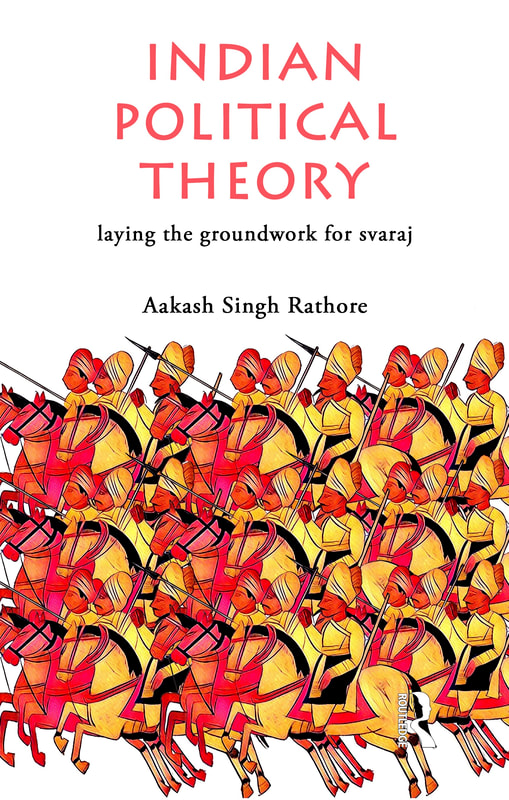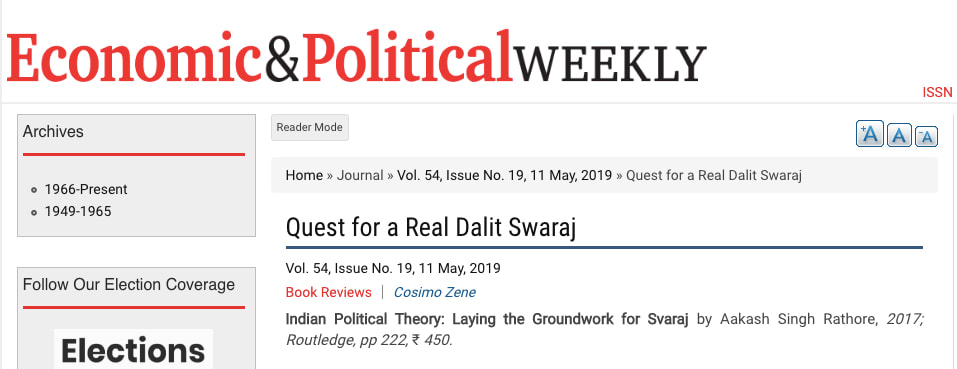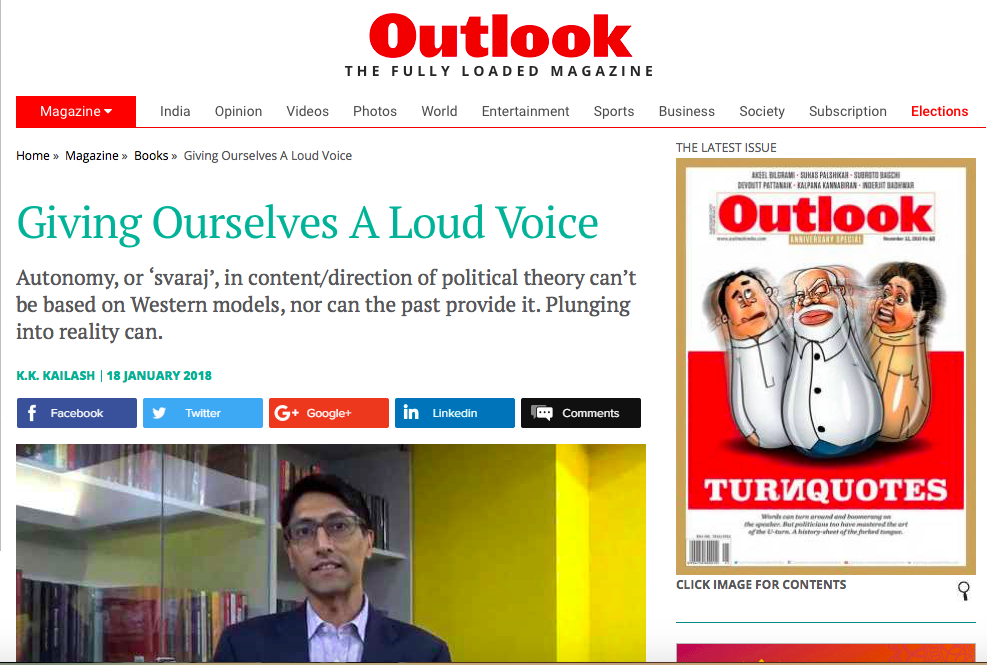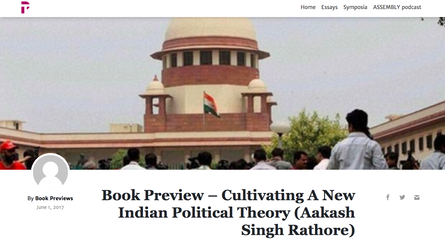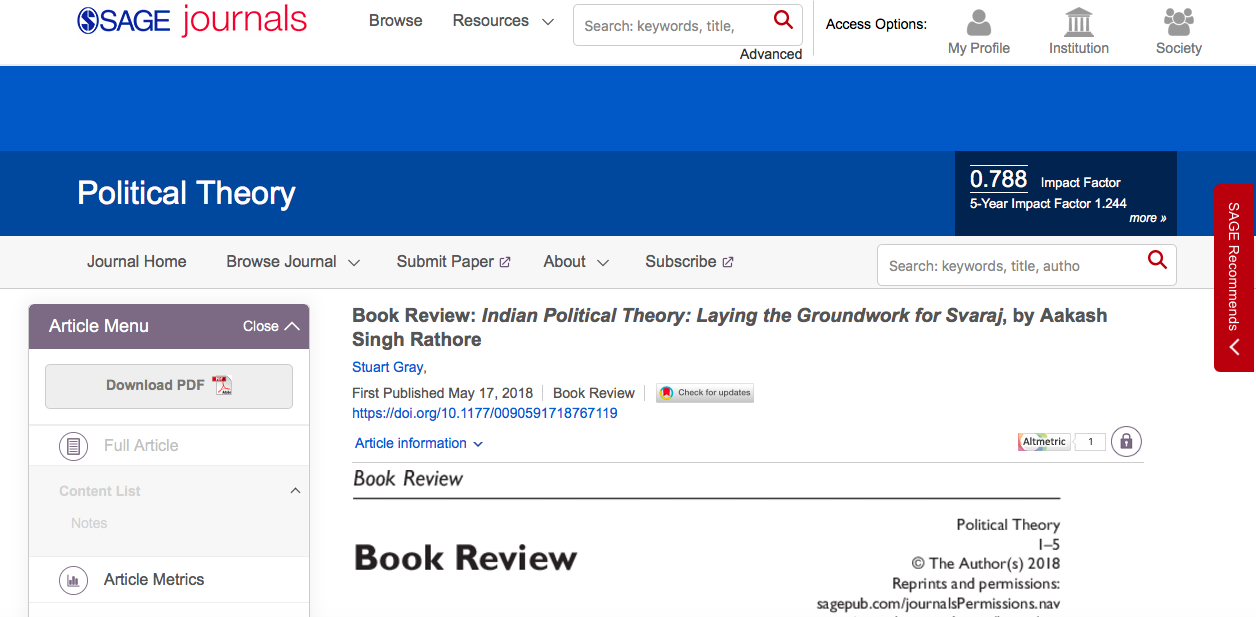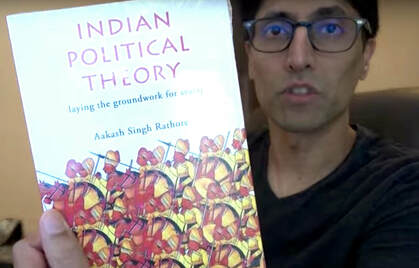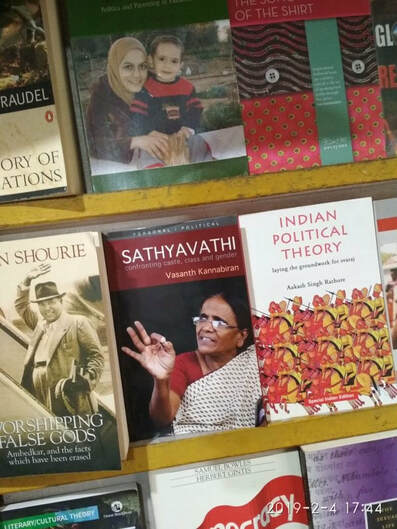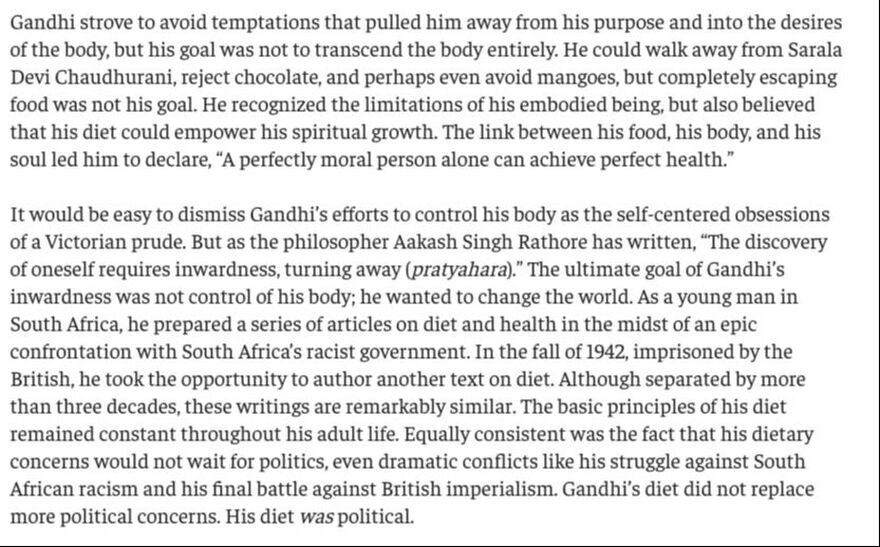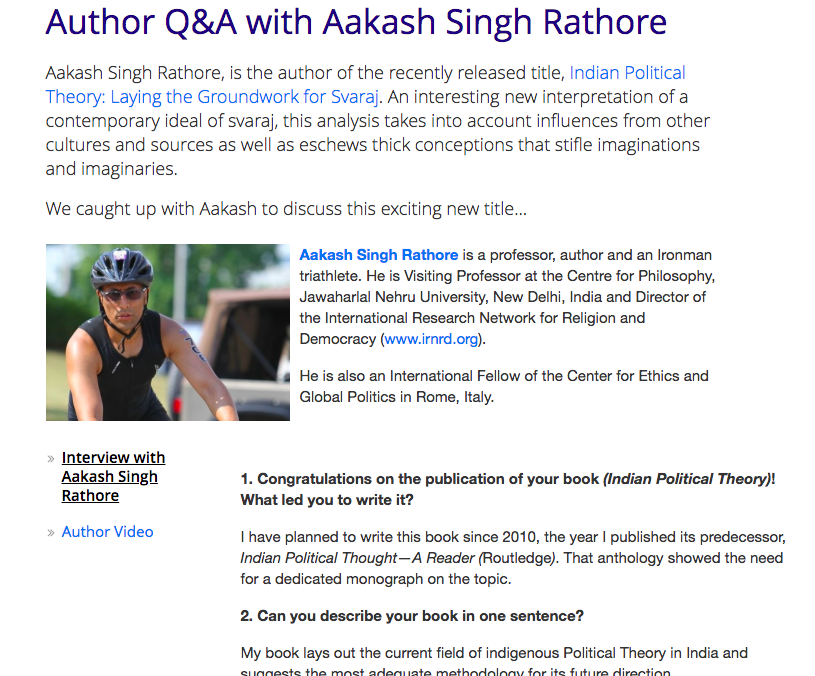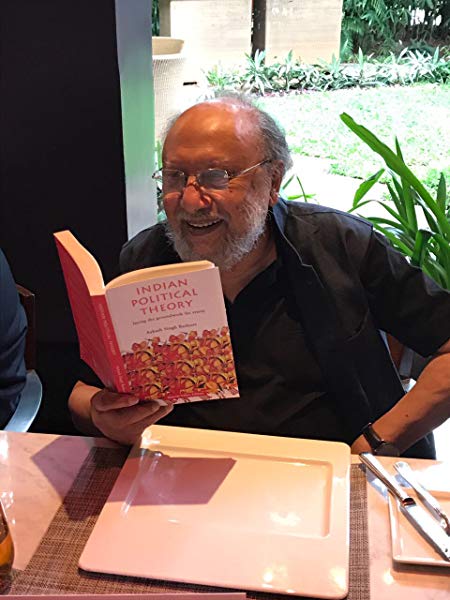- Home
-
Books
- Becoming Babasaheb
- Ambedkar’s Preamble
- Vision for a Nation
- A Philosophy of Autobiography: Body & Text
- Dalit Feminist Theory
- B.R. Ambedkar: The Quest for Justice
- Plato’s Labyrinth
- Hegel's India
- Wronging Rights?
- Hegel's India - Reviews
- Indian Political Theory
- Global Justice
- Rethinking Indian Jurisprudence
- Indian Political Thought
- Discoursing the Post-Secular
- Buddhism and the Contemporary World
- The Future of Political Theology
- From Political Theory to Political Theology
- B. R. Ambedkar: The Buddha and His Dhamma
- India Wins Freedom
- Eros Turannos
- Reading Hegel
- The Complete Indian Wine Guide
- Ironman & Martial Arts
- Media Articles & Appearances
- Publications
- Short Courses
- Talks, Lectures, Conferences, Workshops
- Book Series
- Videos & Podcasts
- Mind & Muscle - Quora Spaces
- Contact
'An excellent overview of contemporary critical political thought in India. A superb resource for students and serious readers.'
|
'Indian Political Theory does much more than provide a perfect cognitive mapping of what its title says. It serves as a compass that allows us to orient ourselves in the pandemonium of Indian politics, wisely avoiding both traps of imitating Western models or of advocating a naive return to some imagined Indian tradition. The book is indispensable for all who want to understand the deepest political motivations of a growing superpower.'
Slavoj Žižek, Birkbeck College, UK 'Indian Political Theory is a welcome volume as it seeks to introduce the reader to the theoretical possibility that remains hidden in the system of ideas developed by thinkers like Babasaheb Ambedkar. In a fundamental sense the volume performs a moral function: it defines the completeness of Indian political theory on ethical grounds, with the demand of an egalitarian accommodation of subaltern thought.' Gopal Guru, Jawaharlal Nehru University, India 'In this fascinating work Aakash Singh Rathore explores the many dimensions of the concept of Swaraj within the broader context of Political Theory, Indian Political Theory specifically. Rigorous revaluation of the concept enables him to reassess the long-standing debate between universalism and particularism while negotiating creatively between western-centric theory and the indigeneity he champions. It is a priceless read.' Neera Chandhoke, Visiting Professorial Fellow, Centre for Law and Governance, Jawaharlal Nehru University, India ‘Aakash Singh Rathore’s thoughtful book, Indian Political Theory: Laying the Groundwork for Svaraj, provides one of the most compelling versions of the first approach . . . He defends a decolonial position and argues that pre-modern revivalist positions will inevitably privilege transitions of indigenous elites.’ Stuart Gray, Political Theory |
Episode 58, THE PRAGATI PODCAST
If Swaraj is your birthright, do you have it? What does Swaraj even mean? Do we have different concepts of self-rule? And how do we even spell the word — sva or swa?
Click here to listen: A Thin Svaraj
Indian Political Theory
Laying the Groundwork for Svaraj
Contents
Introduction: Time for a New Orientalism?
Part One: What Political Theory is Meant to Do
1. The Thick and Thin of Svaraj
2. Political Theory and Comparative Political Theory
3. What is Indian Political Theory?
Part Two: The Inadequacy of Trans-Atlantic Political Theory
4. Theories of "Our" Condition: Habermas and the Post-Secular Turn
5. Theories of "Our" Oppression: Žižek and the Critique of Human Rights
6. Theories of "Our" Liberation: Rawls, Sen, and the Romance of Global Justice
7. An Unkindness of Theories: Trans-Atlantic Marxism, Post-Structuralism,
and Post-Colonial Ethnographies
Part Three: Preconditions for Svaraj
8. Tradition, Hybridity, Equality
9. Gandhi and Ambedkar
10. Dalit Svaraj
Laying the Groundwork for Svaraj
Contents
Introduction: Time for a New Orientalism?
Part One: What Political Theory is Meant to Do
1. The Thick and Thin of Svaraj
2. Political Theory and Comparative Political Theory
3. What is Indian Political Theory?
Part Two: The Inadequacy of Trans-Atlantic Political Theory
4. Theories of "Our" Condition: Habermas and the Post-Secular Turn
5. Theories of "Our" Oppression: Žižek and the Critique of Human Rights
6. Theories of "Our" Liberation: Rawls, Sen, and the Romance of Global Justice
7. An Unkindness of Theories: Trans-Atlantic Marxism, Post-Structuralism,
and Post-Colonial Ethnographies
Part Three: Preconditions for Svaraj
8. Tradition, Hybridity, Equality
9. Gandhi and Ambedkar
10. Dalit Svaraj
Indian Political Theory puts forward a workable contemporary ideal of thin svaraj, i.e., political, and free of metaphysical commitment.
At present, a nativist turn in Indian political theory can be observed. There is a general assumption that the indigenous thought to which researchers are supposed to be (re)turning may somehow be immediately visible by ignoring the colonization of the mind and polity. In such a conception of svaraj (which can be translated as ‘authentic autonomy’), the tradition to be returned to would be that of the indigenous elites.
In Indian Political Theory, this concept of svaraj is defined as a thick conception, which links it with exclusivist notions of spirituality, profound anti-modernity, exceptionalistic moralism, essentialistic nationalism and purism.
However, post-independence India has borne witness to an alternative trajectory: a thin svaraj. The model proposed is inspired by B.R. Ambedkar's thoughts, as opposed to the thick conception found in the works of M.K. Gandhi, K.C. Bhattacharya and Ramachandra Gandhi.
This book argues that political theorists of Indian politics continue to work with categories and concepts alien to the lived social and political experiences of India's common man, or everyday people. Consequently, it emphasises the need to decolonize Indian political theory, and rescue it from the grip of western theories, and fascination with western modes of historical analysis. The necessity to avoid both universalism and relativism and more importantly address the political predicaments of ‘the people’ is the key objective of the book, and a push for a reorientation of Indian political theory.
An interesting new interpretation of a contemporary ideal of svaraj, this analysis takes into account influences from other cultures and sources as well as eschews thick conceptions that stifle imaginations and imaginaries.
At present, a nativist turn in Indian political theory can be observed. There is a general assumption that the indigenous thought to which researchers are supposed to be (re)turning may somehow be immediately visible by ignoring the colonization of the mind and polity. In such a conception of svaraj (which can be translated as ‘authentic autonomy’), the tradition to be returned to would be that of the indigenous elites.
In Indian Political Theory, this concept of svaraj is defined as a thick conception, which links it with exclusivist notions of spirituality, profound anti-modernity, exceptionalistic moralism, essentialistic nationalism and purism.
However, post-independence India has borne witness to an alternative trajectory: a thin svaraj. The model proposed is inspired by B.R. Ambedkar's thoughts, as opposed to the thick conception found in the works of M.K. Gandhi, K.C. Bhattacharya and Ramachandra Gandhi.
This book argues that political theorists of Indian politics continue to work with categories and concepts alien to the lived social and political experiences of India's common man, or everyday people. Consequently, it emphasises the need to decolonize Indian political theory, and rescue it from the grip of western theories, and fascination with western modes of historical analysis. The necessity to avoid both universalism and relativism and more importantly address the political predicaments of ‘the people’ is the key objective of the book, and a push for a reorientation of Indian political theory.
An interesting new interpretation of a contemporary ideal of svaraj, this analysis takes into account influences from other cultures and sources as well as eschews thick conceptions that stifle imaginations and imaginaries.
JNU Lectures on B. R. Ambedkar's Riddles in Hinduism
Proudly powered by Weebly
